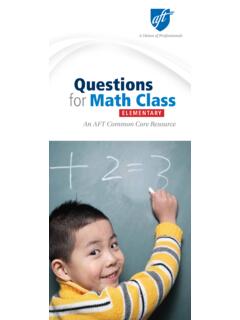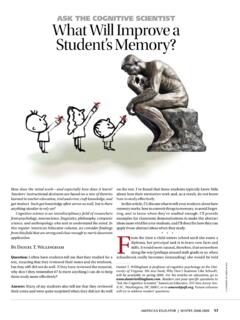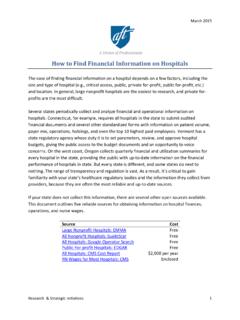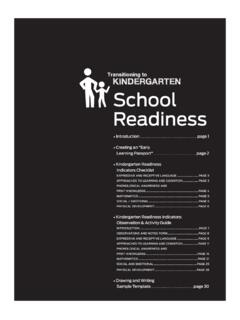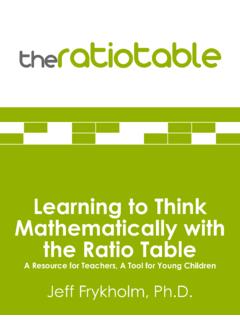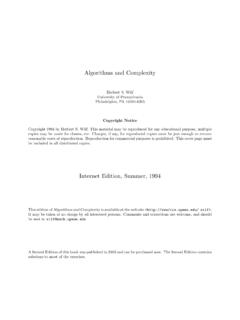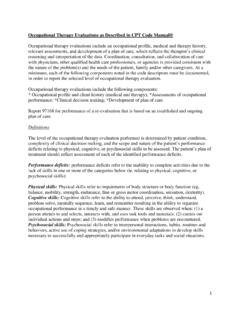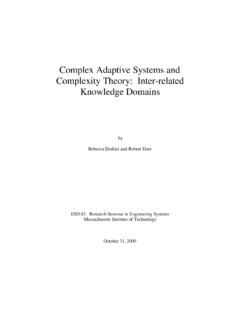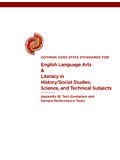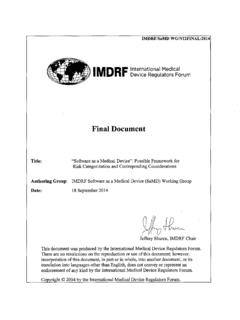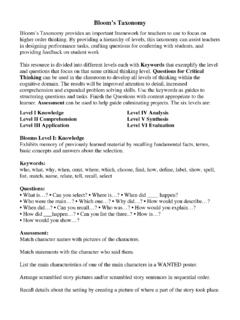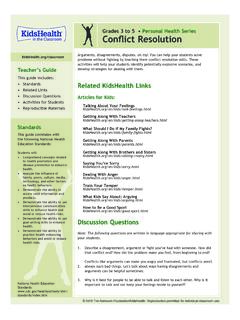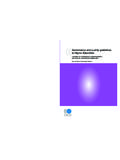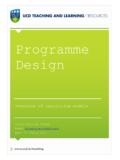Transcription of How Spelling Supports Reading - American Federation of ...
1 Much about Spelling is puzzling. Our society expectsthat any educated person can spell, yet literate adultscommonly characterize themselves as poor spellersand make Spelling mistakes. Many children have troublespelling, but we do not know how many, or in relation to whatstandard, because state accountability assessments seldom in-clude a direct measure ofspelling competence. Few state stan-dards specify what, exactly, a student at each grade level shouldbe able to spell, and most subsume Spelling under broad topicssuch as written composition and language proficiency. Statewriting tests may not even score children on Spelling accuracy,as they prefer to lump it in with other mechanical skills inthe scoring , research has shown that learning to spell andlearning to read rely on much of the same underlying knowl-edge such as the relationships between letters and sounds and, not surprisingly, that Spelling instruction can be designedto help children better understand that key knowledge, result-ing in better Reading (Ehri, 2000).
2 Catherine Snow et al.(2005, p. 86) summarize the real importance of Spelling forreading as follows: Spelling and Reading build and rely on thesame mental representation of a word. Knowing the Spelling ofa word makes the representation of it sturdy and accessible forfluent Reading . In fact, Ehri and Snowling (2004) found thatthe ability to read words by sight ( automatically) rests onthe ability to map letters and letter combinations to words are not very visually distinctive (for example,car,can,cane), it is impossible for children to memorize morethan a fewdozen words unless they have developed insightsinto how letters and sounds correspond. Learning to spell re-quires instruction and gradual integration of informationabout print, speech sounds, and meaning these, in turn, sup-port memory for whole words, which is used in both spellingand sight Reading .
3 Research also bears out a strong relationship betweenspelling and writing: Writers who must think too hard abouthow to spell use up valuable cognitive resources needed forhigher level aspects of composition (Singer and Bashir, 2004).Even more than Reading , writing is a mental juggling act thatdepends on automatic deployment of basic skills such as hand-writing, Spelling , grammar, and punctuation so that the writercan keep track of such concerns as topic, organization, wordchoice, and audience needs. Poor spellers may restrict whatthey write to words they can spell, with inevitable loss of ver-bal power, or they may lose track of their thoughts when theyget stuck trying to spell a what about spell check? Since the advent of word pro-cessing and spell checkers, some educators have argued thatspelling instruction is unnecessary.
4 It s true that spell checkerswork reasonably well for those of us who can spell reasonablywell but rudimentary Spelling skills are insufficient to use aspell checker. Spell checkers do not catch all errors. Studentswho are very poor spellers do not produce the close approxi-mations of target words necessary for the spell checker to sug-gest the right word. In fact, one study (Montgomery, Karlan,and Coutinho, 2001) reported that spell checkers usually catchjust 30 to 80 percent of misspellings overall (partly becausethey miss errors like herevs. hear), and that spell checkers iden-tified the target word from the misspellings of students withlearning disabilities only 53 percent of the , the research base for claiming that Spelling is impor-tant for youngchildren is solid: Learning to spell enhanceschildren s Reading and writing.
5 But what about middle-schoolstudents? Does continued Spelling instruction offer any addedbenefits? Here the research is sparse indeed. Yet, the nature ofthe English language s Spelling /writing system provides reasonto believe that there would be significant benefits to older stu-12 American EDUCATORWINTER 2005/06 How Spelling Supports ReadingAnd Why It Is More Regular and Predictable Than You May ThinkBy Louisa C. MoatsLouisa C. Moats is advisor on literacy research and professional de-velopment for Sopris West Educational Services. She developed Lan-guage Essentials for Teachers of Reading and Spelling , a profes-sional development program for teachers, and Spellography, aspelling curriculum for children in grades 4 through 6. She haswritten several books and reports, including the AFT s TeachingReading IsRocket Scienceand Speech to Print: Language Essen-tials for Teachers.
6 This is her fourth article for American from allocating a small amount of time to continued,appropriate Spelling instruction. In addition to continuing tolearn the rules of Spelling , students can develop a deep under-standing of English by studying the meanings of roots, pre-fixes, and suffixes; families of related words; the historical de-velopment of the English language; and words language oforigin. It s very likely that this sort of word study (in additionto being intrinsically interesting to many students) would sup-port vocabulary development and facilitate Reading by en-abling students to view any new word from the angles ofsound, meaning, language of origin, and syntax. As a result,students would be more likely to be able to figure out the newword s meaning as well as how to spell it and how to use itwith precision.
7 Those of us who can spell reasonably well take forgranted the role that Spelling plays in daily life. Filingalphabetically; looking up words in a phone book, dic-tionary, or thesaurus; recognizing the right choice from the pos-sibilities presented by a spell checker; writing notes that otherscan read and even playing parlor games are all dependenton Spelling . In a literate society, conventional Spelling is ex-pected and anything beyond a few small errors is equated withignorance and incompetence. In fact, the National Commis-sion on Writing for America s Families, Schools, and Colleges(2005) reported that 80 percent of the time an employment ap-plication is doomed if it is poorly written or poorly spelled. Why does Spelling appear on the one hand to be simple,something any reasonably intelligent person should be able todo, but on the other hand, cause so many students academicgrief?
8 How can Spelling be taught so that it will support readinginstruction as well as help students understand how the spellingsystem works and see the ways in which Spelling is predictable?This article attempts to answer both of these questions by firstexploring the nature of the English language s writing/spellingsystem and, second, by outlining the key content that studentsshould master in kindergarten through seventh Making Sense of the English SpellingSystem (It s Not as Irregular as You think )The Spelling of words in English is more regular and pattern-based than commonly believed. According to Hanna, Hanna,Hodges, and Rudorf (1966), half of all English words can bespelled accurately on the basis of sound-symbol correspon-dences alone, meaning that the letters used to spell these wordspredictably represent their sound patterns ( , back, clay,baby).
9 These patterns, though, are somewhat complex andmust be learned ( , when to use ck as in backand when touse k as in book). Another 34 percent of English wordswould only have one error if they were spelled on the basis ofsound-symbol correspondences alone.*That means that thespelling of 84 percent of words is mostly predictable. Manymore words could be spelled correctly if other information wastaken into account, such as word meaning and word authors estimated that only four percent of English wordswere truly irregular. Thus, the Spelling of almost any word canbe explained if one or more of the following five principles ofEnglish Spelling is taken into account: 1) Words language of origin and history of use can explaintheir ) Words meaning and part of speech can determine ) Speech sounds are spelled with single letters and/or com-binations of up to four ) The Spelling of a given sound can vary according to itsposition within a ) The spellings of some sounds are governed by establishedconventions of letter sequences and principle is explained in broad strokes and illustratedwith one or more examples over the next several pages.
10 To-gether, the first two principles explain why English words areso complex and why that complexity is well worth the frus-tration it causes for beginning spellers (and readers). The lastthree principles reveal the order behind the seeming chaos; forthe most part, these three result from well-meaning attemptsto bring regularity to the English language. As you read about these principles, keep in mind that thispart of the article is designed to help teachers better under-stand the nature and structure of the English Spelling is essential background knowledge for teachers of read-ing, Spelling , and writing. As Snow et al. (2005, p. 87) ex-plained, the rules for Spelling are very complex, so it is notsurprising that many highly literate adults who use those rulescorrectly [and automatically] find it difficult to talk aboutthem or answer questions about them.
